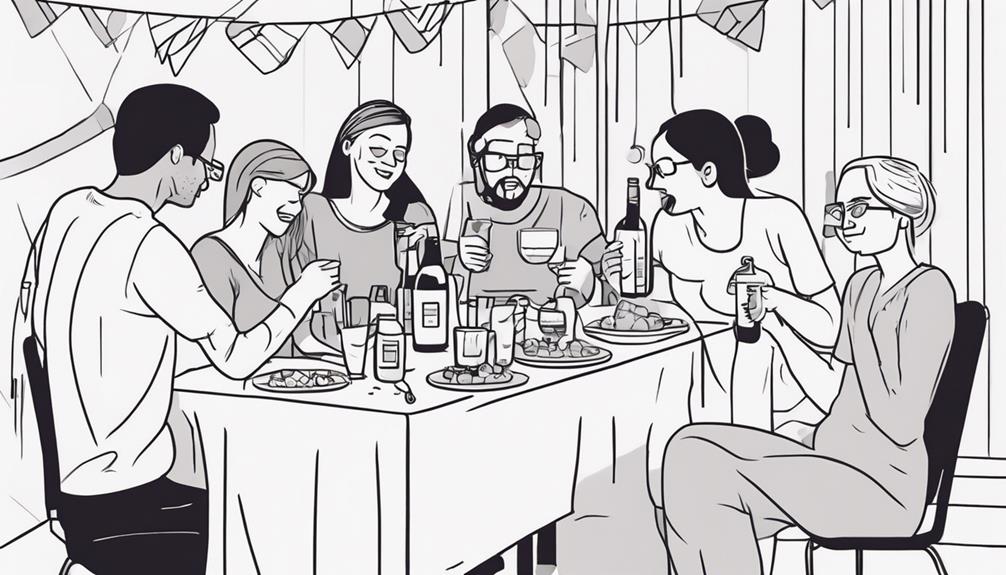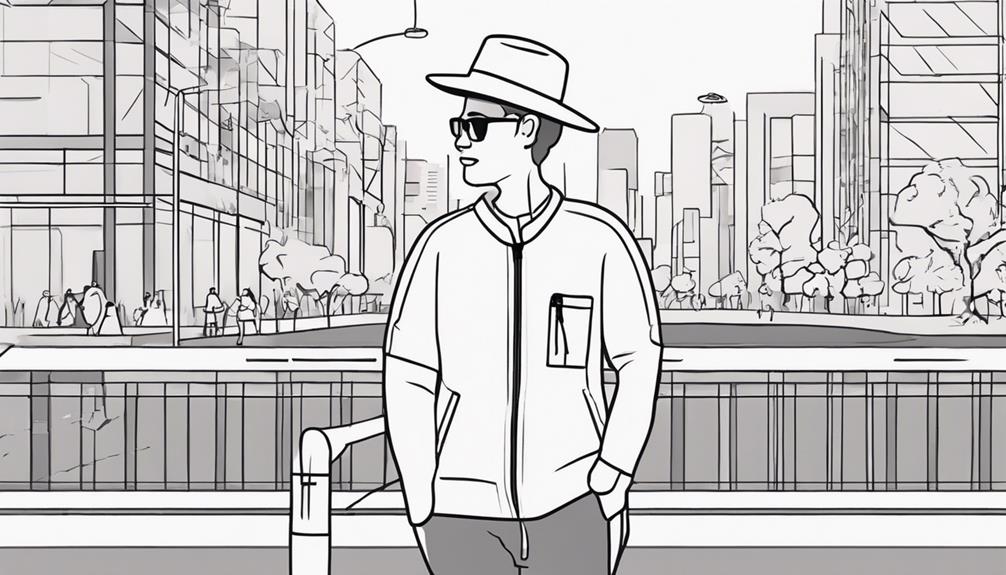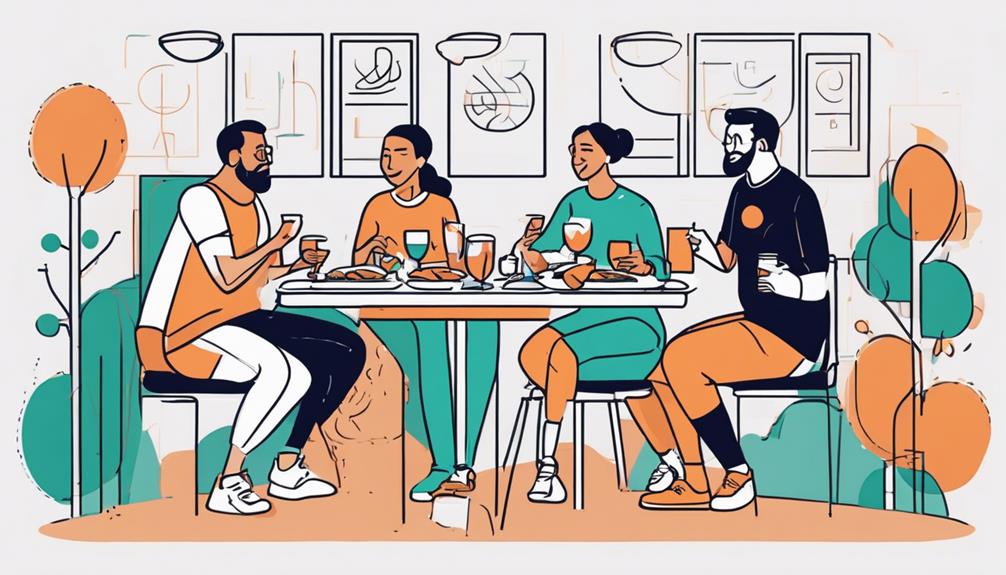Picture this: you're out with friends, laughter fills the air, and the night is alive. But beneath the surface, your blood sugar levels are quietly fluctuating, impacted by this social activity.
How do these interactions affect your diabetes management? Understanding these nuances is crucial for navigating social situations effectively.
Stay tuned to uncover valuable insights into managing your type 1 diabetes amidst the complexities of socializing.
Key Takeaways
- Peer support enhances emotional well-being and diabetes management in Type 1 diabetics.
- Proactive planning for social events stabilizes blood sugar levels and ensures suitable food options.
- Transparent communication with friends and family about diabetes management fosters understanding and support.
- Support networks and education campaigns help combat stigma and empower individuals facing Type 1 diabetes.
Challenges in Socializing With Type 1 Diabetes

Navigating social interactions with Type 1 diabetes presents unique challenges that require constant monitoring and adjustment to maintain optimal health. When it comes to peer support, individuals living with Type 1 diabetes often find solace in connecting with others who share similar experiences. Research indicates that peer support can significantly improve diabetes management by providing emotional encouragement, practical tips, and a sense of belonging within a community facing similar challenges.
However, social anxiety can also be a prevalent issue among individuals with Type 1 diabetes. The fear of experiencing hypoglycemia or having to explain their condition in social settings can lead to increased stress and avoidance of social activities. Studies have shown that social anxiety in individuals with Type 1 diabetes is associated with poorer glycemic control and decreased quality of life. Therefore, addressing social anxiety through therapy, education, and support networks is crucial for enhancing overall well-being in this population.
Strategies for Managing Social Events
Managing social events effectively requires proactive planning and communication to ensure optimal diabetes management and well-being. When preparing for social gatherings, consider the following strategies to navigate these events successfully:
- Plan Ahead: Schedule social events at times that align with your meal and medication schedule to maintain stable blood sugar levels.
- Communicate: Inform your friends or host about your dietary needs, such as carb counting, to ensure suitable food options are available.
- Utilize Support Systems: Lean on your support network for encouragement and assistance in managing your diabetes during social events.
- Stay Prepared: Always carry your glucose monitoring kit, insulin, snacks, and emergency contact information to handle any unforeseen circumstances effectively.
Impact of Blood Sugar Levels on Outings

Maintaining optimal blood sugar levels is crucial for individuals with Type 1 diabetes when engaging in social outings. Meal planning plays a significant role in managing blood sugar levels during outings. By planning meals that incorporate a balance of carbohydrates, proteins, and fats, individuals can better predict and control their blood sugar response to different foods consumed while out. Carb counting is a fundamental skill that aids in adjusting insulin doses accurately based on the amount of carbohydrates in a meal. This skill becomes particularly important during outings where food options may vary, making it essential to estimate and calculate carbohydrate intake correctly.
Being mindful of meal timings and spacing them appropriately around activities can also impact blood sugar levels. Engaging in physical activities during outings can affect blood sugar levels, highlighting the importance of adjusting insulin doses or carbohydrate intake to prevent hypoglycemia or hyperglycemia. Monitoring blood sugar levels frequently and having quick access to glucose sources are vital precautions to maintain stable blood sugar levels during outings for individuals with Type 1 diabetes.
Communicating Needs to Friends and Family
To ensure successful management of Type 1 diabetes during social outings, effectively communicating your specific needs to friends and family is crucial. Open communication plays a vital role in fostering understanding and support from your social circle.
Here are some key points to consider when communicating your needs:
- Honesty: Be transparent about your condition and what you require to manage it effectively.
- Clarity: Clearly articulate how your friends and family can assist you, whether it's reminding you to check your blood sugar levels or understanding the signs of low or high blood sugar.
- Empathy: Help them understand the impact Type 1 diabetes has on your daily life and the challenges you face.
- Feedback: Encourage open dialogue so that they can provide peer support and adjust their behavior to better assist you during social activities.
Overcoming Stigma and Misconceptions

Overcoming stigma and misconceptions surrounding Type 1 diabetes requires a comprehensive understanding of the condition's complexities and debunking common myths through education and awareness campaigns. Education campaigns play a crucial role in dispelling misinformation and fostering accurate knowledge about Type 1 diabetes. By providing factual information through various channels, such as social media, community seminars, and healthcare providers, individuals can gain a better understanding of the condition, thus reducing stigmatization.
Support networks also play a significant role in helping individuals overcome stigma associated with Type 1 diabetes. Connecting with others who've similar experiences can provide a sense of belonging and validation, diminishing feelings of isolation and alienation. These networks offer a platform for sharing stories, offering advice, and receiving emotional support, thereby empowering individuals to confront misconceptions and advocate for themselves effectively.
Frequently Asked Questions
How Can Social Activities Affect Mental Health and Emotional Well-Being in Individuals With Type 1 Diabetes?
Social activities, like supportive friendships, play a crucial role in enhancing mental health and emotional well-being for individuals with type 1 diabetes. Engaging in social interactions fosters coping strategies and promotes self-care practices.
Are There Specific Social Activities or Events That May Pose Greater Challenges for Type 1 Diabetics, and How Can These Be Navigated?
Like a skilled tightrope walker, you must balance blood sugar levels while socializing at special events. Managing insulin levels with precision is key to navigating challenges and enjoying social activities without compromising your health.
What Role Does Peer Support Play in Managing Type 1 Diabetes During Social Events?
In managing type 1 diabetes during social events, peer support plays a crucial role. Peer encouragement can provide emotional backing and practical advice. Sharing social event strategies and tips with peers can enhance your diabetes management and overall well-being.
How Can Individuals With Type 1 Diabetes Ensure They Have Access to Necessary Supplies and Medications While Participating in Social Activities?
Make sure you have your emergency kit stocked with supplies and medications for social activities. Communicate your needs with friends for support. Overcome social stigma by advocating for your inclusion and understanding of your condition.
Are There Any Potential Long-Term Impacts on Social Relationships or Social Interactions for Individuals With Type 1 Diabetes, and How Can These Be Addressed?
When managing type 1 diabetes, long-term social impacts can include dealing with social stigma and potential strains on relationships. Building strong support networks, fostering open communication, and educating others about diabetes can help address these challenges effectively.
Conclusion
As you navigate social activities with Type 1 diabetes, remember that managing your blood sugar levels is crucial for your overall well-being.
Communicate openly with your friends and family about your needs, and don't let stigma or misconceptions hold you back.
By staying proactive and informed, you can enjoy social events while prioritizing your health.
Keep monitoring your blood sugar levels, stay prepared with snacks and medication, and remember that you have the power to control your diabetes, not the other way around.